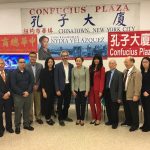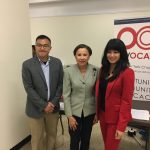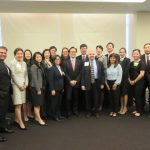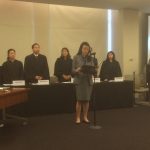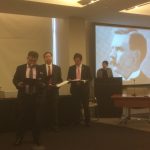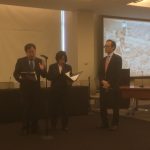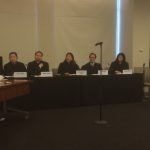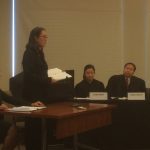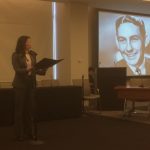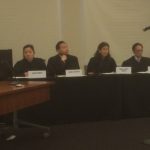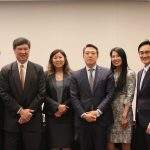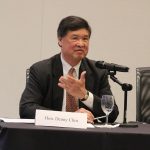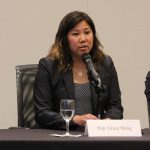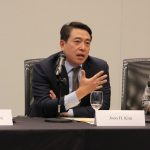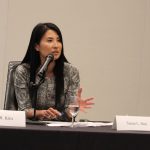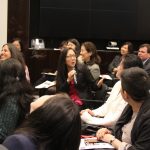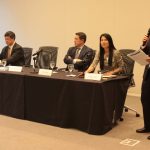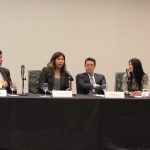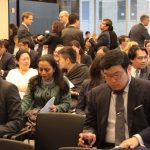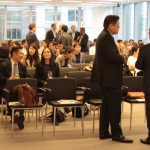AABANY Participates in Inaugural NY Diversity Forum
By: Jason Cheung
AABANY Spring 2017 Intern
Held on April 28, 2017 at the U.S. District Courthouse of the Eastern District of New York (EDNY) and organized by the Federal Bar Association-EDNY Chapter, the inaugural New York Diversity Forum provided an occasion to reflect upon contemporary obstacles and issues confronting diversity in the legal profession.
In addition to AABANY the participating groups were:
- Dominican Bar Association
- Federal Bar Association-EDNY Chapter
- Federal Bar Association-LGBT Section
- Hispanic National Bar Association, Region II (NY)
- International Cultic Studies Association
- Latino Judges Association
- Latino Lawyers of Queens County
- Long Island Hispanic Bar Association
- Muslim Bar Association of New York
- Puerto Rican Bar Association
- South Asian Bar Association of New York
The event commenced with opening remarks from Chief Judge Dora L. Irizarry, U.S. District Court Judge for the Eastern District of New York and the first Hispanic woman to serve as a state judge in New York. Judge Irizarry covered a spectrum of topics in her speech, ranging from the pleasure of being so intimately involved in the naturalization process, to the historical wisdom of George Washington and how he nurtured what may be the greatest social experiment in the history of the world—the American nation. Judge Irizarry shared the following words of advice from George Washington: that “we must never despair…” and that “if difficulties arise, we must put forth new exertion and proportion our efforts to the exigencies of the times.” These words from more than two centuries ago resound to present day.
The Muslim Bar Association of New York led the first panel discussion on “Being Muslim in America: An Introduction to Islam and the Challenges Currently Facing the Muslim Community,” featuring speakers Asim Rehman, General Counsel at the Office of the Inspector General of the NYPD, Sania Khan, Assistant Attorney General in the Civil Rights Bureau of the Office of the New York State Attorney General, and Merium Malik, an Immigration and Criminal Defense Attorney in New York. The discussion touched upon topics such as the legal implications and nuances of the recent Trump Executive Orders and travel bans, potential human rights issues stemming from rights violations at the U.S. border, and recent cases brought forth to contest the legitimacy of the Executive Orders.
The next panel discussion was on the topic of “Religious Freedom vs. LGBT inequality,” led by the LGBT Section of the Federal Bar Association, and featured speakers David Thompson, a partner at Stecklow & Thompson, and Susan Sommer, Associate Legal Director and Director of Constitutional Litigation for Lambda Legal, the oldest and largest national legal organization dedicated to the achievement of full civil rights for LGBT persons and persons with HIV. Much of the discussion centered on the legal inequalities of Mississippi’s legal system (with Sommer citing occasionally hard-to-believe details about the extent of the legal injustices inflicted on LGBT persons in Mississippi) and Sommer’s interpretation of cases such as Obergefell v. Hodges. Thompson discussed the legality of using religious exemptions as an opportunistic means for compromising the rights of LGBT individuals, citing the notorious Hobby Lobby case as an example of the law ruling in favor of employers who opposed the provision of contraception to employees, on the grounds of religious belief.
The third panel discussion, hosted by the International Cultic Studies Association, and featuring speakers Alan W. Scheflin, Emeritus Professor of Law at Santa Clara University School of Law, Stephanie Spanos, M.D., and Robin Boyle Laisure, Professor of Legal Writing at St. John’s University Law School, supplied an interesting departure from the topics of rights and diversity by focusing specifically on the relevance of undue influence and the challenges to establishing its legitimacy as a justiciable issue in the courtroom. Perhaps the most striking aspect of the discussion was the apparent disjuncture between the troubling consequences for victims of mind control and the lack of legal remedy for such victims.
After a short break came a networking lunch featuring Middle Eastern food catered by Tanoreen, which has deservedly been recognized as being among the best Middle Eastern restaurants in Brooklyn. Many EDNY judges, including Hon. Kiyo Matsumoto, Hon. Peggy Kuo and Hon. Marilyn D. Go, joined the attendees for lunch.
The afternoon session started with a panel presented by the Hispanic National Bar Association, Region II (NY), the Latino Lawyers Association of Queens County, the Dominican Bar Association, the Puerto Rican Bar Association, the Long Island Hispanic Bar Association, and the Latino Judges Association, entitled “Racial Profiling of the Latino Community.” Speakers included Jose Perez, Deputy General Counsel of LatinoJustice PRLDEF; Luis Pagan of Pagan Law Group; Christopher Cassar of the Office of Christopher Cassar; and Kevin Satterfield of the NYC Department of Corrections. Moderating the discussion was Matthew Fernandez Konigsberg, Regional President of the National Hispanic Bar Association, Region II (NY).
The panelists recounted horrific cases of injustice, raising issues of police corruption, racial profiling as a precursor to arbitrary detention and prosecution, and the inadequacies of the current Suffolk County legal system to provide relief to victims of racially motivated actions.
The final panel of the forum was led by AABANY and the South Asian Bar Association of New York (SABANY). The topic of discussion was “The Legacy of Exclusion: Learning the Lessons of History, from the Chinese Exclusion Act to the Current Immigration Executive Orders,” and speakers included Rose Cuison Villazor, Professor of Law at UC Davis School of Law; Amol Sinha, President-Elect of SABANY; and Annie J. Wang, a Staff Attorney at the Asian American Legal Defense & Education Fund. Annie Wang began with a presentation tracing the linkage between President Trump’s Executive Order and the very first Federal law banning immigration of any one group—the Chinese Exclusion Act of 1882. Amol Sinha continued the discussion by sharing the story of his mother, who registered to vote after 40 years in America, in an attempt to be more civically engaged, in the face of rising anti-immigrant sentiment in America. He also focused on the Supreme Court cases of Ozawa and Thind, which posed the question of what constituted “white enough” to be eligible for American citizenship.
Rose Cuison Villazor then picked up the thread from the Chinese Exclusion Act to the Immigration Act of 1917, which created the Asiatic Barred Zone and essentially stopped all immigration from Asia, except for Japan. Moderating was Christopher M. Kwok, Co-Chair of the AABANY Issues Committee, who wrapped up the discussion with how the question of “Who is an American?” has been at the heart of all immigration debates and exclusionary laws, and how the nature of that answer has been both inclusive and nativist. Indeed, the lessons of active civic engagement and a clear-eyed understanding of history are critical to ensuring that we remain vigilant against repeating the mistakes of our past.
Many thanks to the Federal Bar Association-EDNY Chapter for organizing this timely forum and for including AABANY and the many other bar associations and groups that took part.
This article originally appeared in the Spring 2017 issue of The AABANY Advocate. Click here to find that issue and more.
Apply to become a member of the IRS Advisory Council (IRSAC)!
Apply to become a member of the IRS Advisory Council (IRSAC)!
The
IRS Advisory Council (“IRSAC”) members provide an organized public
forum for IRS officials and representatives of the public to discuss key
tax administration issues, and provide the IRS Commissioner and
division leadership with important feedback, observations and
recommendations.
Below is the link to the IRSAC application. The deadline to apply is June 16, 2017. Please also e-mail AABANY Tax Committee Co-Chair Joon Pae at joonbeom.pae@aabany.org if you are interested in applying.
Kobre & Kim Joins Am Law 200 Ranks
Kobre & Kim Joins Am Law 200 Ranks
AABANY
congratulates Kobre & Kim for joining The
American Lawyer’s 2017 Am Law 200 list!
In the latest rankings, the Am Law
200 featured Kobre & Kim as a Firm of Note, highlighting it as “part of a
very small club of relatively young law firms” that nevertheless became one of
the “largest grossing firms in the country.” The editors also noted that
throughout its 14-year existence, the firm had a fondness for innovation that culminated in a specialized business model that “captured unique aspects” of different
practice areas.
The editors cite the firm’s “model of continuous innovation” and its unique work, “such as cases that span multiple international jurisdictions” and representation of clients who “need super-specialized assistance with a high-stakes problem.”
The American Lawyer’s article featuring the firm is available here.
The
Am Law 200 is an annual list that ranks the most profitable and successful U.S.
law firms by revenue, based upon research obtained both from the firms
themselves and independently by The
American Lawyer’s editorial team and research department. The common
denominator among Am Law 200 firms is profitability, both for the firm overall
and on a per-attorney basis, stemming from a diverse income stream from each of
firm’s practice areas.
Please join us in congratulating Kobre & Kim, which also happens to be our Sponsor Spotlight in the latest issue of The AABANY Advocate.
8th Annual NYC Multicultural Festival
8th Annual NYC Multicultural Festival
Celebrate our diverse cultures!
Come out and experience spectacular mask and masquerade performances from around the world at the 8th Annual NYC Multicultural Festival!
SATURDAY, June 3, 2017
WHERE: Jackie Robinson Park (Bandshell)
85 Bradhurst Avenue New York, NY10030 (Cross Streets: West 146th St. & Bradhurst Ave)
FESTIVAL ACTIVITIES:
- Unbelievable live music and dance performances starting at 12pm
- Live Dj spining your favortie tunes
- Free Body and face painting for children and adults
- Love Yourself spa Pavilion (International beauty treatments)
- Food and merchandise to purchase from our international vendors
- Children’s arts and craft activities at the Children’s International Pavilion
- Safety and wellness activities
- FREE Giveaways
- Informational resources
WHAT IS NYC MULTICULTURAL FESTIVAL?
NYC MULTICULTURAL FESTIVAL IS FOR EVERYONE; it’s about celebrating all cultural expressions through music, dance, poetry, art, food, fashion, etc. The festival is organized for the community by the community.
#THEANCESTORSARECOMING
WHO CAN ATTEND?
Everyone!!! Children, adults, senior citizens and families will all have a blast at this festival.
ARE THERE TICKETS?
Entry is FREE! We encourage you to register and RSVP here to get early access to special offers and so that we can plan the event better for you.
WHERE DO I GET THE NYC MULTICULTURAL FESTIVAL SPECIAL FUN BAG?
You can pre-order your Special Fun Bag ticket here and we’ll have your Special Fun Bag available at the event check in desk. The Special Festival Fun Bag includes 1 #TheAncestorsAreComing T-Shirt, a Mask, body paint tattoo pass, fun costume jewerly and a cool trophy stating “I support the NYC Multicultural Festival!”
WHAT SHOULD I WEAR?
Be creative in your expression of YOU! Have fun with it!
WILL FOOD BE AVAILABLE?
Yes. There will be vendors selling delicious food and drinks.
HOW DO I GET THERE?
The NYC Multicultural Festival is located in beautiful West Harlem less than 20 minutes from lower Manhattan.
Fireside Chat with Joon Kim, Acting U.S. Attorney for the Southern District of New York
By: Albert W. Suh, Esq.
Co-Chair, Young Lawyers Committee
Tucked away between the Beaux-Arts grandeur of the Manhattan Municipal Building and the imposing brutalist cube of One Police Plaza is a neat and unassuming gray office building. Yet within that building sit some of the brightest legal minds and one of the most powerful law enforcement offices in the United States – the U.S. Attorney’s Office of the Southern District of New York – and at the top sits a man who, similarly, betrays little of his expansive influence and accomplishments behind his clean lines and unassuming demeanor.
He may be one of the most powerful attorneys in America, leading an office of more than 200 federal prosecutors, but Joon Kim, the Acting United States Attorney for the Southern District of New York doesn’t let that faze him. With humility, grace, and candor, Joon continues the outstanding work and tradition of the federal prosecution office of the Southern District of New York.
Joon Kim has served in various capacities at the U.S. Attorney’s Office of the Southern District of New York for roughly a decade. He began his legal journey at Harvard Law where he first took interest in the U.S. Attorneys’ Offices during a Federal Criminal Prosecution class. From there, he went on to clerk for the Honorable Miriam Goldman Cedarbaum in the Southern District of New York. It was there, as a law clerk, that Joon solidified his decision to become an Assistant U.S. Attorney (“AUSA”), after observing the high levels of skill and excellence that the AUSAs demonstrated. As an AUSA, Joon rose through the ranks for six years to become a prosecutor in the Organized Crime and Terrorism Unit, successfully working on prosecutions against numerous violent criminal organizations and leaders, such as John Gotti and Sui Min “Frank” Ma.
Joon left the U.S. Attorney’s Office in 2006 to pursue a career at Cleary Gottlieb Steen & Hamilton LLP as a partner in white-collar criminal defense and regulatory enforcement. When asked about the transition from prosecution to defense and back, Joon says easily that there was no difficulty for him in transitioning because of his firm belief in the justice system and a central tenet of that system is, in his words, a “good, fair, robust, and vigilant defense.” However, even while at Cleary Gottlieb, Joon longed to return to public service, his lifelong passion.
Joon is driven and inspired by the example of his father, who served as a diplomat for the Republic of Korea. Joon always knew that he wanted to emulate his father in dedicating his life to serving his nation—South Korea, for the father, and the United States for the son. Joon’s young life overseas, with years spent in Korea, Jordan, and the UK as he followed his father’s diplomatic missions, also provided him with a greater sense of perspective, he says. In engaging such varying cultures, Joon learned to embrace perspectives not his own. As a prosecutor, he says that this has helped him pursue justice more effectively by allowing him to place himself in the shoes of witnesses, jurors, and even defendants. It’s an approach that has won him not just his cases but also the admiration and respect of colleagues, victims, and even adversaries.
In 2013 Joon returned to the SDNY at the behest of then-U.S. Attorney Preet Bharara. In announcing Joon’s return to the office, Mr. Bharara said in an email to his staff: “For those of you who don’t know Joon, you will find him to be smart, thoughtful, and funny, in addition to being an exacting lawyer with unerring judgment.” It’s a sentiment that has held firm over the years. As Mr. Bharara left the office and later at his first public appearance, at the Cooper Union, he reiterated that he felt that the U.S. Attorney’s Office of the Southern District of New York was in good hands with Joon.
From his position as Chief Counsel, Joon went on to become the Chief of the Criminal Division, then the Deputy U.S. Attorney, and finally to the position of Acting U.S. Attorney. Yet through it all, when asked about his greatest achievements, Joon humbly hearkens back to his days as a line-prosecutor in the Organized Crime Unit. For Joon, taking down violent gangs was a fulfillment of his promise to serve the public – to hold accountable those who preyed upon the innocent, those who hurt people with impunity and without remorse. Of course, he is also very proud of the more recent directions that both he and the office have taken, in aggressively and successfully pursuing white-collar criminals, terrorism, and public corruption.
When asked about the future of the office, Joon expressed his faith in the 227 year-old institution of the U.S. Attorney’s Office of the Southern District of New York in fiercely and independently seeking justice. He fully intends to continue that tradition, applying the width and breadth of his experience to making sure that the office continues its proud tradition of “doing the right thing,” as they say.
As for himself, Joon simply says that he’ll see what happens next. In the meantime, Joon hopes to see and to inspire more vibrant Asian American participation in public life, whether through public service and public interest work or through more engagement in public discourse. In his dedication to justice and his excellence in service to the public, Joon Kim continues to set the example – and the bar – for Asian American attorneys throughout New York and beyond.
This article was originally published in the 2017 Spring edition of The AABANY Advocate, which can be found on our website here.


